Republicans in Wisconsin are asking voters to strip the governor of the power to unilaterally spend federal money, in response to the billions of dollars that have flowed into the state during the COVID-19 pandemic.
Democratic governor. Tony Evers could spend most of that money as it saw fit. Most of it went to small businesses and economic development, much to the ire of Republicans who felt the Legislature should have oversight.
That’s what would happen under a pair of related constitutional amendments that will go before voters in the Aug. 13 primary. The changes would apply to Evers and all future governors and would cover all federal money that comes to the state without specific spending requirements, often in response to disasters or other emergencies.
Democrats and other opponents oppose the amendments, calling them a legislative power grab that would limit governors’ ability to respond quickly to a future natural disaster, economic crisis or public health emergency.
If the amendments pass, Wisconsin government “will become even more dysfunctional,” said Julie Keown-Bomar, executive director of the Wisconsin Farmers Union.
“Wisconsinians are tired of riding the partisan bandwagon, but it is critical that we go to the polls and vote ‘no’ on these changes because they will only take us further astray,” she said in a statement.
But Republicans and other advocates say it is a necessary check on the governor's current powers, which they say are too broad.
The changes increase “accountability, efficiency and transparency,” Republican Sen. Howard Marklein, a co-sponsor of the initiative, said at a legislative hearing.
The two questions, proposed as a single amendment and then separated on the ballot, passed the GOP-controlled Legislature twice, as required by law. Voter approval is required before they can be added to the state constitution. The governor does not have veto power over constitutional amendments.
Early, in-person voting by mail for the August 13 election begins Tuesday across the state and runs through August 11. Early voting locations and times vary.
Wisconsin Republicans have increasingly turned to voters to approve constitutional amendments as a way to override Evers' vetoes. Halfway through his second term, Evers has vetoed more bills than any governor in Wisconsin history.
In April, voters approved amendments banning the use of private money in elections and affirming that only election officials may operate the ballot boxes. In November, an amendment was introduced to the ballot to clarify that only U.S. citizens may vote in local elections.
Republicans have put the question on the August primary ballot. It is the first time a constitutional amendment has been introduced in that election, where turnout is much lower than in November.
The effort to curb the governor's spending power also comes amid ongoing battles between Republicans and Evers over the extent of legislative authority. Evers won a case in the Wisconsin Supreme Court in July that challenged the GOP-controlled Legislature's budget committee's power over spending on conservation programs.
According to a report from the Legislative Reference Bureau, in 1931, during the Great Depression, Wisconsin governors were given the power by the legislature to decide how federal money was spent.
“Times have changed and the influx of federal dollars calls for a different approach,” Republican Rep. Robert Wittke, who sponsored the amendment, said at a public hearing.
It was a power that was called into question during the Great Recession of 2008, a period when the state received a large influx of federal aid.
But calls for change grew louder during the COVID-19 pandemic, when the federal government gave Wisconsin $5.7 billion in federal coronavirus relief aid between March 2020 and June 2022. Only $1.1 billion came with restrictions on how it could be spent.
Most of the money went to grants for small and medium-sized businesses and local government, to purchase emergency supplies and to pay health care providers to cover the costs of the pandemic.
Republicans pushed for more oversight, but Evers vetoed a Republican bill in 2021 that would have required the governor to submit a plan to the Legislature's Budget Committee for approval.
Republicans ramped up pressure for change after an independent investigation in 2022 found Evers was not transparent about how he decided to spend the money.
One amendment specifies that the Legislature cannot delegate its power to decide how to spend money. The Second Amendment prohibits the governor from spending federal money without approval from the Legislature.
If it passes, the Legislature would be able to adopt rules on how federal money is managed. That would give them the ability to change the rules based on who is serving as governor or the purpose of the federal money.
For example, the Legislature could allow governors to spend disaster relief money without approval, but require that other money first be submitted to the Legislature.
The measures are opposed by voting rights groups, the Democratic Party of Wisconsin and a number of other liberal organizations, including those working to overturn the Republican-led legislative plans, the League of Women Voters of Wisconsin and Wisconsin Faith Voices for Justice.
Wisconsin Manufacturers and Commerce, the state's largest business lobbying group, and the Badger Institute, a conservative think tank, were the only groups to voice support in the Legislature.

